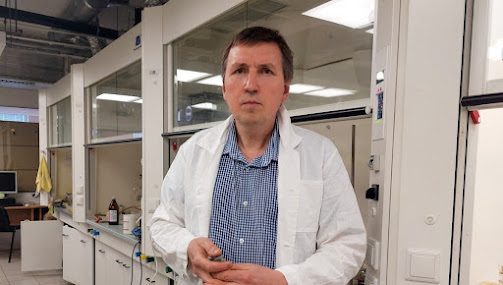 |
| According to Grigory Zyryanov, industrial partners, including foreign ones, are interested in the developments. Photo credit: Anna Marinovich |
Ural scientists are developing chemosensors for the diagnosis and therapy of various diseases. These are compounds that change their luminescent properties upon external exposure or contact with organic cells. They can be used to find and suppress cancer cells, diagnose cardiovascular diseases, and determine the level of sugar or drugs in the blood. One of the new developments of scientists from the UrFU is chemosensors for controlling the content of metals in the blood, since an overdose of metals can be dangerous for the body. Grigory Zyryanov, professor at the Department of Organic and Biomolecular Chemistry at Ural Federal University, spoke about this on the air of Komsomolskaya Pravda radio.
"One of our activities is the creation of chemosensors for the detection of zinc cations in biological fluids, including blood. Zinc is involved in many physiological processes in the body; it is necessary for normal growth and stabilization of cell membranes. In some cases, such as colds, taking zinc supplements can help boost the body's immune response and speed recovery. However, it is necessary to control zinc levels, since zinc overdose is toxic for the body," explains Grigory Zyryanov.
The body's intoxication with heavy metals can be caused not only by taking drugs, the scientist notes. It can also occur due to environmental poisoning by industrial enterprises. For example, due to the release of waste water into nearby water bodies or penetration of metals into the soil near factories. Chemosensors will be useful in this case as well: they can not only act as detectors of heavy metals, but also help in their extraction, for example, from water.
"We are developing stable compound complexes that allow us to detect metals in samples and extract them from there. For example, to get rare-earth metals out of process tailings for industry, to extract toxic elements such as cyanides, fluorides from water in order to avoid environmental contamination and poisoning of living organisms," Zyryanov adds.
Source/Credit: Ural Federal University
chm102022_01
